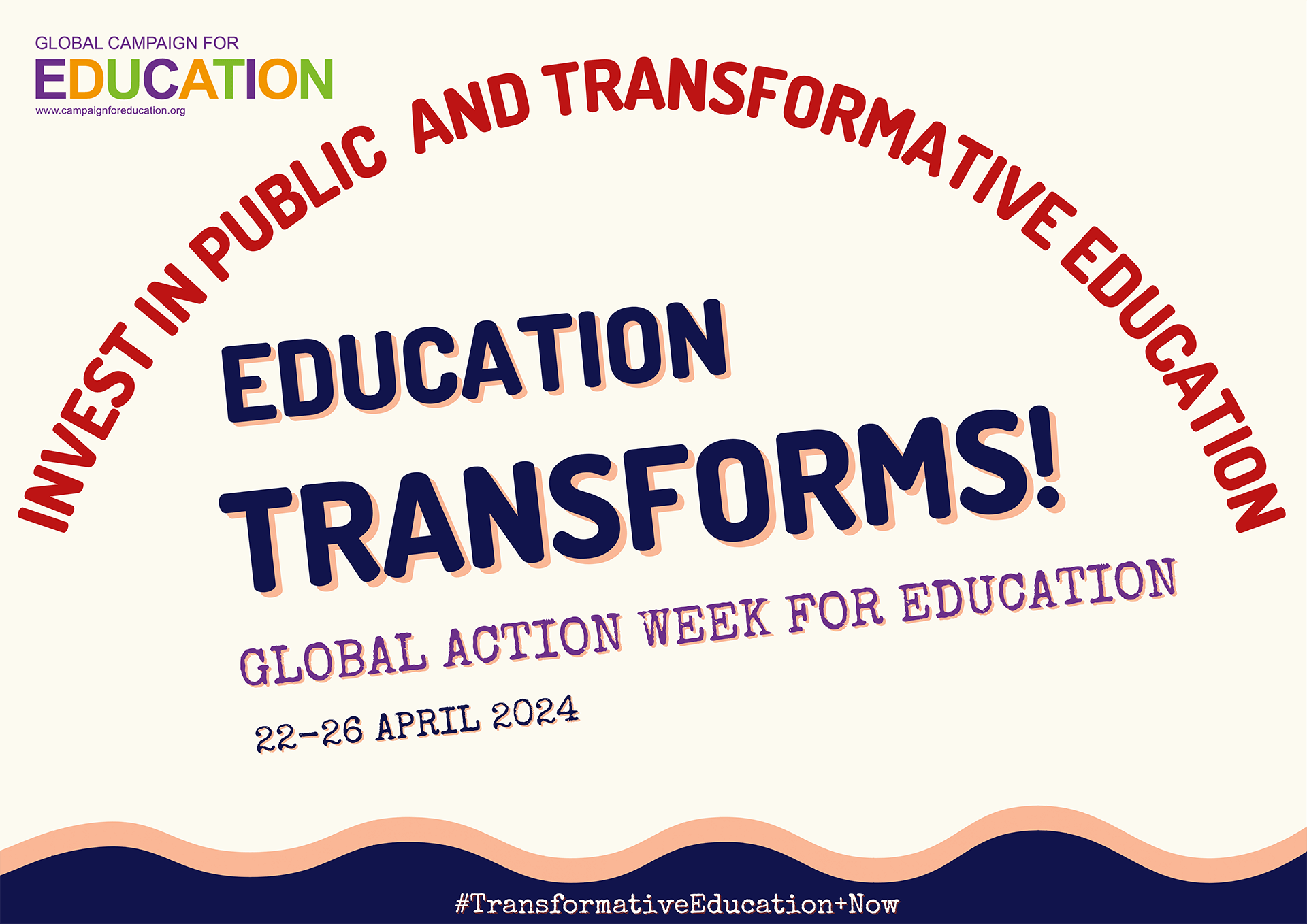Global Action Week for Education GAWE 2024
GAWE 2024 Campaign – Transformative Education
Concept and Campaign Plan
April 22 -26, 2024
The Global Action Week for Education 2024 (GAWE 2024) on April 22-26 is an important landmark as it launches the 25th anniversary of the Global Campaign for Education (GCE). It will signify the historic moment in Dakar, Senegal in 1999 when movements and civil society organizations (CSOs) from different continents joined forces to have a unified voice in Education for All (EFA).
GAWE 2024 also marks the 22nd annual week-long campaign coordinated by GCE and celebrated worldwide by education movements and advocates to remind governments, decision-makers, and other stakeholders to deliver on the global commitments for education. EFA was first convened in Jomtien, Thailand, renewed in Dakar, Senegal, reiterated as Education 2030 in Incheon, South Korea, and integrated as SDG 4 in the SDG Agenda 2030 in 2015.
Three decades after Jomtien, while there had been progress, barriers to education persist. UNESCO reported in 2023 that 250 million children remain out of school and 773 million adults around the world, mostly women, still lack basic literacy skills. The existing challenges of gender inequity, discrimination, quality of education, and decreasing education financing are further compounded by the multiple crises that countries are grappling with. Conflicts, economic crises, gender violence, racism, health and climate disasters signal the need for an education that will enable children, youth, and adults to deal with the current realities and shape the future.
Education has enormous power to transform realities. Transformative education has been at the core of GCE’s advocacy. In defending the transformative role of education, GCE challenges attempts to frame education solely as a narrow set of learning outcomes.1 It believes transformative education drives social justice, sustainable development, and individual and collective freedom. Education should be a significant contributor to peace, as a way to build values, knowledge, attitudes, skills and behaviours to live in harmony with oneself, with others and the environment.
Transformative education was mostly a discourse of civil society organizations and educationalists until COVID-19. Transforming education and education systems have been at the center of education policy actions as schools and learning centers closed and education systems shifted to online education and distance learning. Several countries started rethinking and revising their curricula, connecting learning to daily life, enabling intergenerational learning, and integrating health into education.
Aside from the shift in delivery, the pandemic brought to the fore pressing issues that were neglected in the past by education systems. These issues include mental health, water and sanitation, early marriage’s impact on girls’ education, the digital gender divide, disability-inclusive technology, social protection to prevent school dropout, hazard pay and protection for teachers, and remote and different pathways to learning.
Two years after the pandemic, the Transforming Education Summit (TES) convened by the UN Secretary-General galvanized global efforts to transform education. More than 130 countries committed to “rebooting their education systems and accelerating action to end the learning crisis.3” As many countries faced decreasing education budgets, the Summit called on countries to continue investing in education and fast-track actions to achieve SDG 4 targets. GCE strongly participated in the 5 thematic action tracks namely:
- Inclusive, equitable, safe and healthy schools
- Learning and skills for life, work and sustainable development
- Teachers, teaching and the teaching profession
- Digital learning and transformation
- Financing of education
GCE supported the TES with its firm belief that for education to be transformative, transforming education is required. Education reforms are required to both rethink educational content and prepare education systems to continuously adapt to changing realities, by decolonizing curricula and addressing challenges such as addressing the language of instruction. Education reforms will need to be contextually and culturally sensitive to reach those who are currently furthest behind with education, such as indigenous peoples4.
Following the decision of the GCE World Assembly 2022 and reiterating GCE’s vision and advocacy for transformative education the Global Action Week 2024 (GAWE 2024) will center on the theme of Transformative Education. GAWE 2024 will also be a moment for coalitions, teachers’ unions, students and youth, NGOs, and movements to follow up with their respective governments and development partners on their national and global commitments to the Transforming Education Summit (TES).
As 2030 approaches, GCE will remain vigilant in calling governments’ attention to their commitments to SDG 4 — equitable, inclusive, quality education and lifelong learning opportunities for all. In the forthcoming Summit of the Future, GCE will advocate for the inclusion of transforming education in the agenda to “deliver a better present and safeguard the future.”

